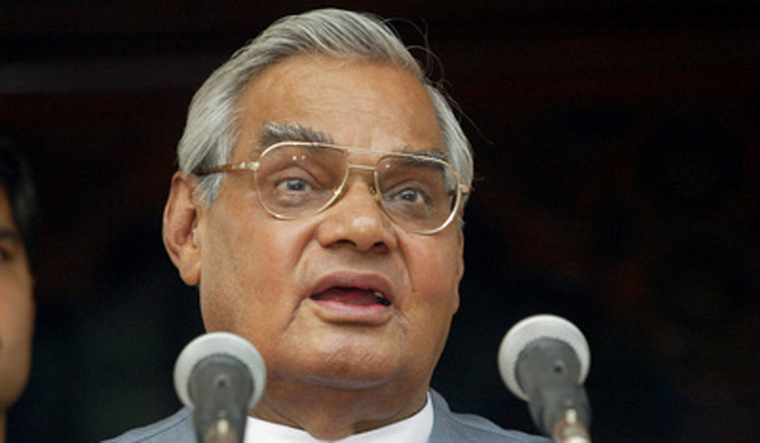If Indira Gandhi made India capable of making the bomb, Atal Bihari Vajpayee made the bomb, and announced it. He changed world power politics by creating a sixth nuclear power.
That India would explore the nuclear option had been no secret; it was there in the BJP's election manifesto in black and white, with which the Vajpayee-led NDA rode to power in 1998. And a few days before the actual nuclear test, Vajpayee's defence minister George Fernandes even declared China as India's number one enemy. THE WEEK interpreted the statement as a signal justifying an impending nuclear test, and it turned out to be true within days.
Pakistan retaliated with its own tests within weeks, and a seventh nuclear power was born. As the world came down upon India with sanctions—Australia and Japan were the nastiest among the non-nuclear nations; the former literally expelled an Indian defence team that had gone for training—Vajpayee waved the olive branch to Pakistan. The signal was that since India and Pakistan were on the same boat, they could formulate a joint strategy to face the sanctions. The Lahore bus ride was the result.
However, within weeks, his government fell for lack of one vote when the AIADMK withdrew support. Vajpayee got the Lok Sabha dissolved and went for another round of election. Hardly had the country moved into election mode, when the Lahore bus lost its way and strayed into Kargil heights—so to speak.
The military-backed insurgency into Kargil, launched by Pakistan army chief Gen (retd) Pervez Musharraf, was a stab on the back for Vajpayee. It also tested his statesmanship.
As Vajpayee ordered the Army to evict the intruders, Army chief Gen. V.P. Malik found the going tough. Operation commanders would always like to take a flanking approach or hit the enemy from the rear or flank. However, Vajpayee forbade the Army from crossing the Line of Control, so as to keep the war confined to the limited military objective of evicting the intruders.
With strike from the flanks being ruled out, Army Gen. Malik sought air support. Air Chief Marshal A.Y. Tipnis weighed the situation and found that use of air power carried the risk of escalating the war.
He needed a political decision.
Vajpayee called the cabinet and accorded political sanction for air support—but he also drew a 'Lakshman rekha' saying even the Air Force should not cross the Line of Control.
The task was tough for the military, but it also revealed Vajpayee's strategic mind. He would not risk an escalation of the war. Limiting the operation to within the Line of Control, and limiting the military objective to merely evicting the intruders and establishment of status quo ante-bellum, he calculated, would gain him the necessary diplomatic support from the world powers.
That proved right. The world powers all came in support of India, since India's endeavour was only to establish the status quo, a justified military objective.
The use of air power was a nasty shock to Pakistan. Their entire diplomatic effort since then was to get India call off air strikes. Pakistan prime minister Nawaz Sharif even called up US president Bill Clinton to put pressure on India to call off the air strikes. But Vajpayee stood firm.
The 'Lakshman rekha' that Vajpayee had drawn prolonged the conflict, but ultimately that proved to be Vajpayee's winning masterstroke. That was interpreted as extreme restraint on nuclear India's part even in the face of military provocation. It proved to the world that India was a power that could be trusted with the deadly atom bomb.
In terms of military doctrine, the Vajpayee rekha enabled the Indian defence brass to formulate a new one—that there is scope for a limited war within a nuclear overhang.
That was something new in the global nuclear strategising since the Second World War. Till then, no nuclear power had fought a direct war—nuclear or non-nuclear—with another nuclear power. It had been thought that even a limited or local war was not possible between two nuclear powers, unless they were prepared for escalation.
This had tremendous implications in the South Asian geopolitical context. It meant that India still was keeping the option of using its conventional military power to settle the Kashmir issue.
It wouldn't be an exaggeration to claim that it was this realisation that prompted Pervez Musharraf, who had since evicted Nawaz Sharif and assumed power, to seek dialogue. The result was the Agra summit.
The summit was bound to flounder. Both sides had approached it with differing perceptions. To Vajpayee and India, it was an attempt at drawing up a framework for dialogue on all outstanding issues. But to Musharraf's militarily-conditioned mind, the dialogue was for trying to draw a framework for resolving Kashmir. The military mind couldn't think beyond territory.
The Vajpayee era was perhaps the best for the Indian military after the Indira Gandhi days. Following the Kargil war, there was a rapid attempt at modernising the forces with new and advanced equipment.
Like Indira, Vajpayee knew where to allow the military have its say, and where to assert civilian supremacy. Let's not forget that Vajpayee remains the only prime minister who also sacked a military chief. He sacked the recalcitrant Navy chief Admiral Vishnu Bhagwat, who had openly defied civil authority.


